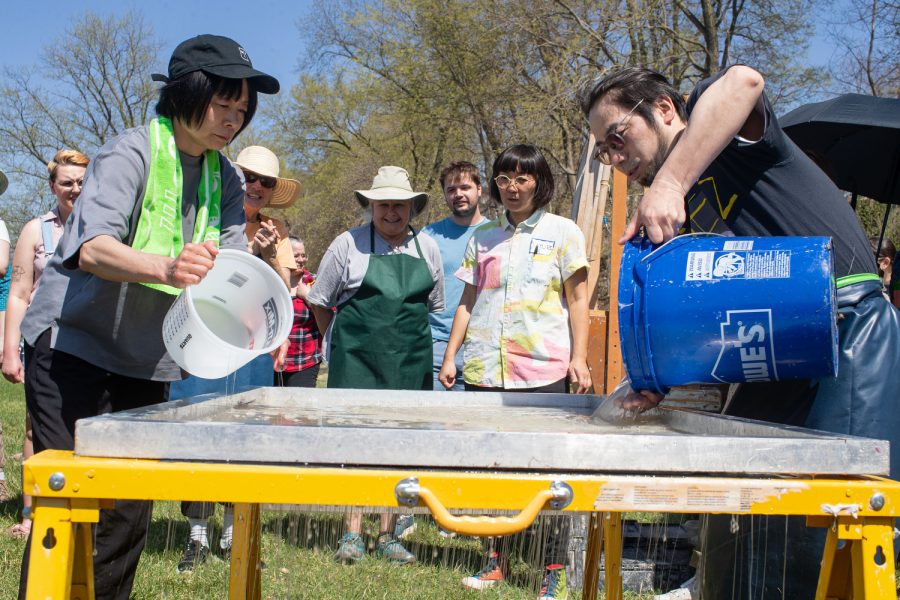Japanese papermaking festival hosted by UI Center for the Book brings tradition to Iowa
A winner of the UI International Programs’ Major Project Award, and hosted by the UI Center of the book, a Japanese Papermaking festival hosted international artists for talkbacks and demonstrations from April 13-14.
Masami Igarashi and Hideaki Taki from the Echizen papermaking village in Japan prepare a canvas during a Japanese papermaking festival in Iowa City on Friday, April 14, 2023.
April 18, 2023
Paper pulp, woven threads, and fiber painting: The Iowa City public dipped their hands into traditional Japanese fiber arts and “washi” last weekend.
The series of events, titled “The Future of a Tradition: Asian Craft, Iowa Innovation, and Japanese Papermaking,” is an International Programs Major Project Award winner hosted by the University of Iowa Center for the Book. Public events included a paper artisan talkback and an interactive papermaking festival.
“The hope is that students will participate in the various events and learn from the resident artisans. It would be all the better if students tried their hand at papermaking themselves,” Russell Ganim, associate provost and dean of International Programs wrote in an email to The Daily Iowan.
Nicholas Cladis, co-organizer of the events and papermaking lecturer at the UI, took a group of grad students to Echizen, Japan, last summer to learn more about traditional Japanese papermaking with Masami Igarashi and Hideaki Taki.
“I lived there for a really long time before I moved to Iowa,” Cladis said. “So, I’ve known [Igarashi and Taki] for almost 10 years.”
The first public event of the festival was an artisan talkback with Igarashi and Taki on April 13 in the Adler Journalism and Mass Communication Building. Igarashi and Taki are both generational traditional paper making artisans and will be in Iowa City until April 24.
“Both of their mills have more than 100 years of history. [Taki is] seventh generation, and Masami is fourth generation. Their mills have a long history in Japan,” Cladis said. “Because of that connection that they share, there’s a lot of satisfaction in what they do.”
The Papermaking Festival took place April 14 on North Hall’s lawn. Demonstrations were given by Cladis, Taki, Igarashi, and papermaking student volunteers.
“Having been able to come here to Iowa gives me energy to continue doing what I do because I can share it with people. People are really interested in what I’m doing here, and that drives and inspires me,” Taki said, translated by Cladis for DI.
Upon arrival, festival attendees were met with a name tag station and were given a handout with vocabulary and artisan bios to guide them through the stations. The participants were taken to a postcard making station where they could decorate their freshly made paper with the delicate flowers provided. Kelsey Voy, a Master of Fine Arts student volunteer, guided the participants at this station.
“I’m in the papermaking class this semester. Learning all of the techniques that go into this type of papermaking is so valuable,” Voy said.
The next station was a full-size traditional basin where participants could practice their techniques by making a 13-inch piece of paper. Traditional Japanese paper, or washi, is made by soaking fibers in water then collecting those fibers on a nylon screen to dry into usable paper.
RELATED: Contemporary music festival to bring international collaboration to Iowa
“I want to show people and share the knowledge of washi with local Iowans and with students here, and that’s what I’m looking forward to doing the most,” Igarashi said, translated by Cladis. “I hope that people will come and get a good impression of Japanese culture and that it will make them want to explore more and to deepen their knowledge of the craft of Japanese papermaking.”
The next station was a thread-making station. Using the same fibers from the paper pulp, Taki then took that thread for a pulp painting demonstration on canvas.
“Iowa is kind of the perfect place because you have a lot of people who make things here, right?” Cladis said. “You have writers, you have artists, and you have the students who went there [Echizen], so they have that experience. It’s a perfect synthesis of things.”



